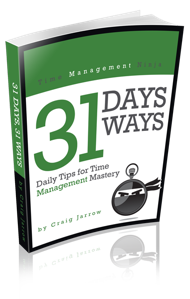
You have lots of great productivity tools to help you stay productive.
Yet, that new day planner is now sitting in a drawer.
And the new gadget that you “had to have” is still in it’s package.
Instead, you end up grabbing the nearest pad of paper or writing things down on Post-It notes.
What’s stopping you from using your time management tools?
Why Aren’t You Using Your Productivity Tools?
I was recently coaching an individual who appeared to have assembled a great time management system.
He had lots of productivity tools. The issue was… he wasn’t using them.
His desk calendar never left his desk.
He had a notebook for notes, but he regularly forgot it at home.
He had an iPad, but barely used it. (And really wasn’t sure how to use it.)
Time management tools like these are meant to boost your productivity. However, they don’t do much good if you aren’t using them.
“Your time management tools can’t help you be productive if you don’t use them.” (Tweet this Quote)
Are your time management tools getting work done or are they sitting idle on a shelf somewhere?
Here are 7 Reasons You Aren’t Using Your Time Management Tools:
- Not the Right Tools For the Job – If the tools you have aren’t suited for the job at hand, you won’t use them. This may sound like common sense. Yet, many businesses wonder why their employees fail to adopt new software and tools. It’s usually because it doesn’t fit the work.
- Too Many Tools – When you end up with multiple tools that serve the same function, inevitably some of them are going to end up sitting on a shelf. Avoid redundancy. Keep things simple by following the Power of 1… one tool for each type of task.
- Not the Right Tools for You – Pick tools that you like and are comfortable using. I call this “Choosing Tools You’ll Use.” It makes all the difference between a tool that gets used and one that ends up forgotten.
- You Don’t Know How to Use Them – Getting the latest shiny gadget won’t do you any good if you don’t know how to operate it. Take the time to learn how to properly use it. If you won’t read the instructions, there are lots of great tutorials online.
- Not Life Oriented – Many individuals stop using their tools because they do not fit into their lifestyle. For example, unless you work entirely from a PC, you wouldn’t want to put all of your info in a desktop based system. Similarly, that new desk calendar may have plenty of space on it, but it’s not portable enough to carry with you. Make sure your productivity tools are life-oriented to your daily activities.
- Too Complex – If your tools are too complicated, you will stop using them. This applies to todo lists that require 37 steps to record a simple task, as well as time management systems that require a flowchart to make decisions. Keep your tools as simple as possible.
- Not Part of Your Habits – Your productivity tools must be part of your routine. When using them becomes habit, they become part of your behavior. The best tools eventually fade into the background and you barely notice that you are using them.
Use Your Time Management Tools
Your time management tools are there to enable you to be more productive.
However, they can’t be of service if they are sitting in a drawer or waiting for you back home.
Make sure you choose tools you’ll use… and then use the tools you choose.
Question: Do you have unused productivity tools? What is stopping you from using them? You can leave a comment by clicking here. I am the author of Time Management Ninja and help individuals and companies reclaim their time to be more productive. As well, I am the author of the book
I am the author of Time Management Ninja and help individuals and companies reclaim their time to be more productive. As well, I am the author of the book 

Or too slow to access (too much friction).
It is important to reduce friction to access your productivity tools so that you use them without resistance and soon it will become a habit.
Agreed!
I would put this under #6. It amazes me when people use tools that take more time than the original task.
I am back at using mostly paper and pencil in the office for everything. Ten once before I leave those notes will get transferred to a new list, still in paper or stored on Wunderlist. If it requires so, then it goes into Evernote.
This system seems to be working good for me now… I am done looking for more productive ways and want to stick to something for a while. Trying to filter out too much of the outside world noise as well…
Thank you for this aricle. It just dawned on me that my habits are not in alignment to choose and then effectively use my productivity management tools. I need to first reevaluate my lifestyle and choose tools accordingly.
Good article. My main problem came with the time I’d take to organize my time. I like to do things at a detail level, and in that order of things, I’d spend hours on an excel, giving colors, creating formulas, etc., just for ending up using that excel less than two weeks.
I decided to focus on simple, and coded myself a tool (I’m a tech guy). It’s worked for me this last year, and it looks like it will keep that way. I’ve put it online for free: http://taskman.com.ar/site/ .
It’s not magic, but it works (and it’s free), so if you feel it might help you, jump in 🙂
Many time management tools are free of cost that are just a pain to use and there are some paid tools that are a waste of time.
I’ve used HourGuard for three months and Zoho for six months. However, when I tried Replicon’s ( http://www.replicon.com/time-tracking-softwares.aspx ) software, I didn’t want to switch over to any other software because it has made my work easy and my tasks are finished quickly, too.
Very true, that’s the same story with everyone. Time management is very
necessary if one wants to be productive.
Employee Management
Great post. In our organization, we never had another thought or confusion about project management tool. We use proofhub(www.proofhub.com) and its quite simple and intuitive.